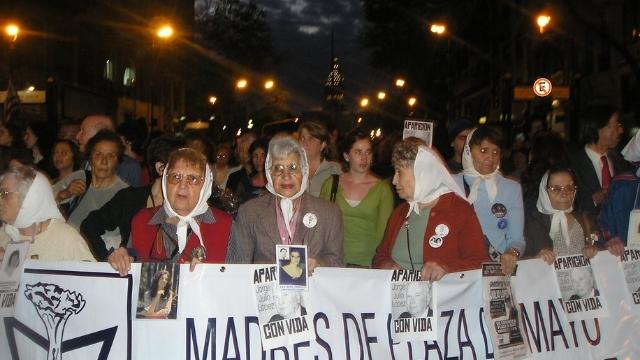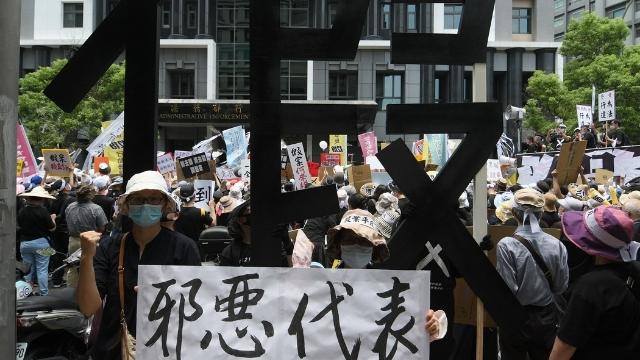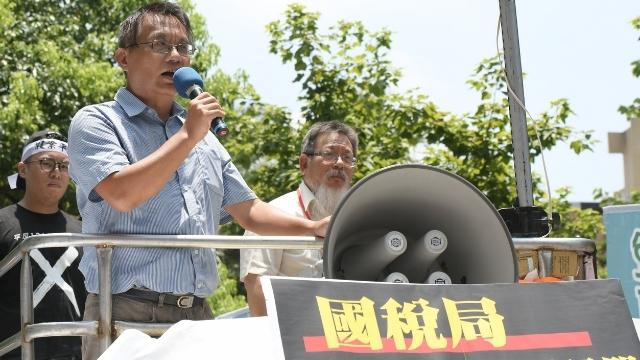11/29/2021TSAI CHENG-AN A+ | A-
The road to rectifying past injustices in the ROC has proved bumpy. The Tai Ji Men case will be a significant test.
by Tsai Cheng-An*
*A paper presented at the mid-term conference of the Research Committee on Sociology of Religion (RC-22) of the International Sociological Association, Vilnius, Lithuania, November 11–14, 2021.

The Universal Declaration of Human Rights 1948 (UDHR), the International Covenant on Civil and Political Rights 1996 (ICCPR), the European Convention for the Protection of Human Rights and Fundamental Freedoms 1950 (ECHR), and the United Nations Declaration on the Elimination of All Forms of Intolerance and of Discrimination Based on Religion or Belief 1981 (UN Resolution 1981), all state that everyone has the right to freedom of thought, conscience, and religion. These declarations emphasize that freedom of religion or belief (FORB) is a core human right and a foundation of global governance. In 2000, the United Nations Human Rights Council established the Special Rapporteur on FORB, whose main task is to promote this human right in order to strengthen global governance.
In a speech at the Dodd Center for Human Rights on October 15, 2021, American President Joe Biden argued that the atrocities of human rights violations and persecution are not over. He said that it is time to speak up for human rights, and warned the world that silence on human rights abuses is complicity. “The US President should stand by when human rights are under attack, and maintain their legitimacy,” Biden proclaimed, stating that the defense of human rights is in the DNA of the American people.
Besides the human right of FORB, another universal value is transitional justice. Transitional justice emphasizes the need to confront historical wrongs and pursue social justice, as Rosita Šorytė has just emphasized in this conference.
Taiwan is now recognized as a democratic country under the rule of law, but it still has its flaws and is not a country that fully protects human rights. The Tai Ji Men incident in 1996 was a human rights case in which the authoritarian Kuomintang (KMT) government clearly violated FORB. It was a mistake and a crime committed by the old regime. The Democratic Progressive Party (DPP) government that succeeded in 2016 has not faced up to the legacy of history, redressed the historical injustice, or completed the democratic transformation it pursued.
Before 1987, Taiwan was an authoritarian regime with no real protection for FORB, as Professor Introvigne has explained in this session. Finally, on July 15, 1987, the martial law was lifted. Then, Taiwan gradually transformed from an authoritarian system to a post-authoritarian one. The KMT regime declared that the people could enjoy FORB, but still persecuted religious groups that were seen as unfriendly to the ruling party. During the political crackdown after the 1996 presidential election, several of Taiwan’s most active religious groups were suppressed, and Tai Ji Men became one of the victims of the KMT regime’s crackdown on new religious movements. This was an unjust act of persecution of the human right of FORB by the Taiwanese government of the time.
Tai Ji Men is a spiritual group of ancient qigong and martial arts that extends love and peace to the world through cultural activities. In 1966, the Tai Ji Men Qigong Academy was established by law, and for 55 years there has never been a tax problem. Why was there a tax problem only in the six years from 1991 to 1996?

The Supreme Court rendered the final verdict on the Tai Ji Men case on July 13, 2007, and found no crimes, no tax evasion, no violation of tax code. All four defendants were exonerated and received compensation from the Nation for their previous wrongful imprisonment. At that time, the tax problem derived from the criminal cases should have been dismissed according to the law. This point was clearly stated by two former vice-ministers of Finances, Wang Deshan and Wang Rongchou, that “the tax cases in Tai Ji Men are derived from criminal cases, and if in the criminal cases the defendants will be found not guilty, then the tax penalties will be revoked.”
The central issue in the tax problem was whether the disciples’ (dizi) so-called red envelopes given to their master (shifu) included tuition for tutorial classes or voluntary gifts. A final verdict of the Supreme Court recognized that “the gifts presented by the dizi to their shifu are voluntary gifts in nature.” In 2018, the Supreme Administrative Court confirmed that Tai Ji Men is a qigong and martial arts group and not a tutorial class.
However, in August 2021, the media uncovered a shocking piece of evidence in which tax collector Shih Yue-Sheng admitted on video that prosecutor Hou Kuan-Jen, who was the main responsible for the persecution of Tai Ji Men, had sought his perjury.
Prosecutor Hou Kuan-Jen did not question the validity of this testimony against the defendant as the law requested, but directly cited it as the primary evidence in the tax evasion lawsuit against Tai Ji Men. The video confirms that the prosecutor’s accusation of tax evasion against Tai Ji Men was simply the fabrication of a false case, and that he obviously used a criminal prosecution to violate FORB’s human rights.
According to the above verdicts, after 25 years of legal petitions, and non-violent efforts of legal and tax reform advocacy initiatives by Tai Ji Men, the Taipei National Taxation Bureau and the Central District National Tax Bureau finally recognized the nature of gifts of what Tai Ji Men dizi had given to their shifu in five tax years out of the six in dispute, leaving only tax year 1992 unchanged.
However, the National Taxation Bureau is still not correcting its errors because of its authoritarian mindset. Despite the thousands of people in Taiwan who participated in the civil disobedience on the streets, and the support of scholars and human rights experts from home and abroad, the government continues to tax and impose fines on the tax year 1992. In 2020, the lands and properties of Dr. Hong and Tai Ji Men were put on auction by the Administrative Enforcement Agency and confiscated by the state after two failed auctions.
Such an outcome has drawn the attention and support for Tai Ji Men of Taiwanese and international scholars and experts. The main reason for this is that the Tai Ji Men human rights case protest has had a wide range of positive effects on Taiwan and also on the international community. There are two reasons for this. First, Tai Ji Men insists on truth, human rights, and righteousness of conscience, and is unwilling to accept the threat of compromising and paying for fake tax bills. Tai Ji Men’s 25 years of non-violent activism has led the Taiwanese community to face up to the importance of taxpayer’s human rights, and has led to opportunities for legal tax reform, which is a manifestation of the universal values of human rights and the transitional justice in practice.
Second, international religious freedom scholars and human rights experts have often seen cases of persecution of religious beliefs that have led to the loss of lives, but they are also worried that the tax law may be used by the ruling authorities to persecute religious groups they do not like, which is a new form of persecution of FORB. International experts and scholars must stand up together to prevent persecution of FORB in the form of tax law, to defend FORB’s universal values as human rights, and to urge Taiwan government to implement the universal values of transitional justice.
Taiwan’s subsequent democratically elected governments have delivered some results in their efforts to implement transitional justice. For example, in 2009, during the presidency of Ma Ying-Jeou, the Legislative Yuan approved the International Covenant on Civil and Political Rights (ICCPR) and the International Covenant on Economic, Social, and Cultural Rights (ICESCR) as Taiwan domestic laws, and declared that “human rights should be established, transitional justice should be promoted, human rights protection should be strengthened, and an effective relief mechanism should be established.”

In 2017, President Tsai Ing-Wen passed the Law on Promoting Transitional Justice. According to this law, by March 26, 2021, a total of 5,837 criminal cases determined by criminal verdicts during the martial law period were revoked, which is a specific act of revoking wrong verdicts and announcing the vindication of cases, realizing the spirit of “restoring reputation” of transitional justice. It also confirms that wrong verdicts are not unchangeable.
However, the DPP government has excluded the need for transitional justice for those who suffered from human rights persecution after 1992, and this is what President Tsai Ing-Wen has yet to accomplish in terms of transitional justice in Taiwan.
Any persecution of human rights by the government with state power is an authoritarian persecution. It does not matter when the persecution occurred. A persecution is a persecution, and needs to be addressed. Only by doing so can we achieve true social reconciliation and justice.
Taiwan is a country under constant threat from China and has been under authoritarian ruling for decades, and because of this historical burden, the road to democracy in Taiwan is more difficult than in the West. From the Martial Law period to the present, old habits, old ideologies, and old ways of governance from the authoritarian regime still exist, and bureaucrats with old ways of governance still occupy various positions in the liberal democratic bureaucracy.
After several changes of political parties in Taiwan, the issue of human rights being violated by the state has not been given enough attention. On the contrary, after the rulers claimed to have gained a formal democratic majority, they constructed a new argument of “democratic legitimacy,” so that the consolidation of Taiwan’s liberal democratic system has not yet been completed, but is even facing the threat of a new bureaucratic authoritarian system.
In particular, during Taiwan’s transition from an authoritarian system to a democratic system, the legal and tax bureaucratic authoritarianism constructed by the administrative courts and the financial and tax administrations from 1992 to the present has still not changed into a modern system “for the purpose of protecting human rights,” but remains a legacy of the authoritarian past that continues to harm basic human rights and hinder social progress.
Evidence of Taiwan’s legal and tax bureaucratic authoritarianism is as follows: (1) The Ministry of Finance has dominated tax administration with more than 9,500 interpretation notes, which exceed the law and seriously violate the principle that taxes should remain under the law. By the end of August 2020, out of 794 interpretations by the Justices of the Taiwan Judicial Yuan, a total of 131 interpretations related to tax were issued, and 56 laws and interpretation letters were declared unconstitutional; in 17 of them, the spirit or principle violated by those declared unconstitutional can be seen at work in the Tai Ji Men tax case. (2) Most of the judges in the administrative courts do not have a good understanding of tax law, and render more than 93% of their rulings in favor of tax authorities. And in the limited number of cases in which the taxpayers win, the tax bill is returned to the NTB instead of being revoked directly, giving the NTB the right to issue new tax bills. (3) The Legislative Yuan, in cooperation with the tax administration, has been giving incentive payments to tax officials to encourage aggressive taxation. The ill-intentioned incentive system has become the root of the violation of the taxpayers’ human rights.
In 2012, in a report on the tax structure and government tax reform measures in Taiwan, the Taiwan Control Yuan recommended that the Ministry of Finance (MOF) should review the outdated tax interpretation notes in order to protect the rights of the public. However, there are still more than 9,000 interpretation notes, many of which have been in use since the authoritarian period, but no active action has been taken by the Ministry of Finance. Taiwan’s tax system is still stuck in the authoritarian era.
In September 2021, item 3 in the agenda of the United Nations Human Rights Council was the “Promotion and protection of all human rights, civil, political, economic, social and cultural rights, including the right to development.” The NGO CAP-LC told the Council that it was particularly concerned about the use of property seizures as a weapon to discriminate against minority religious and spiritual groups. This is a new form of persecution of FORB’s human rights by tax laws, which has happened not only in Taiwan, but also in France and other countries. Such acts are definitely not in accordance with the universal values of human rights.

The Tai Ji Men human rights case is a crime committed by the post-authoritarian government in 1996 and in the subsequent years. In 2021, the Taiwan government must face up to the various cases of human rights violations caused by government violence under the post-authoritarian system after the lifting of the martial law in 1987, and the Tai Ji Men human rights case has already become an international landmark case.
The Tai Ji Men case involves universal values of FORB and transitional justice, which are values that must be defended by democratic camps around the world. The persecution of FORB through tax law is not allowed by the universal human rights values.
In 2000, the UN Human Rights Committee appointed an independent Special Rapporteur on FORB with the task of identifying and responding to human rights impediments to FORB worldwide. In 2004, UN Secretary-General Kofi Annan’s report to the General Assembly established four principles of transitional justice: (1) investigating abuses and pursuing the truth, (2) compensating victims, (3) punishing perpetrators, and (4) ensuring that abuses do not occur in a democratic environment. In 2012, the UN Human Rights Committee appointed an independent International Special Rapporteur on Transitional Justice with the mandate to properly implement transitional justice. These four principles also apply to the redress of human rights cases of Tai Ji Men. More importantly, there should be no time limit for implementing the transitional justice and achieve social reconciliation.
I believe scholars and experts of human rights should call on President Tsai Ing-Wen, remind her that human rights and transitional justice are the core values of her administration, and the Tai Ji Men human rights case is a key to demonstrating these core values and social justice in practice.
The Tai Ji Men case is no longer an administrative or legal issue, but an issue of FORB human rights that affects Taiwan’s international reputation. Only effective action by the President of Taiwan can rectify the continuing persecution of the human right of FORB by the NTB and the Administrative Enforcement Agency, and implement the transitional justice, so that Taiwan can become a truly democratic country governed by the rule of law and respectful of human rights.
Source: Bitter Winter
